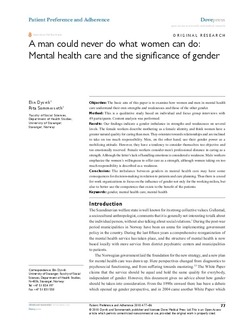A man could never do what women can do : mental health care and the significance of gender
Journal article, Peer reviewed
Permanent lenke
http://hdl.handle.net/11250/184050Utgivelsesdato
2010Metadata
Vis full innførselSamlinger
Originalversjon
Patient Preference and Adherence, 4(2010)4, 77-86Sammendrag
Objective: The basic aim of this paper is to examine how women and men in mental health care understand their own strengths and weaknesses and those of the other gender. Method: This is a qualitative study based on individual and focus group interviews with 49 participants. Content analysis was performed.
Results: Our findings indicate a gender imbalance in strengths and weaknesses on several levels. The female workers describe mothering as a female identity, and think women have a greater natural quality for caring than men. They orientate towards relationships and are inclined to take on too much responsibility. Men, on the other hand, use their gender power as a mobilizing attitude. However, they have a tendency to consider themselves too objective and too emotionally reserved. Female workers consider men’s professional distance in caring as a strength. Although the latter’s lack of handling emotions is considered a weakness. Male workers emphasize the women’s willingness to offer care as a strength, although women taking on too much responsibility is described as a weakness.
Conclusion: The imbalance between genders in mental health care may have some consequences for decision-making in relation to patients and care planning. Thus there is a need for work organizations to focus on the influence of gender not only for the working milieu, but also to better use the competence that exists to the benefit of the patients.
